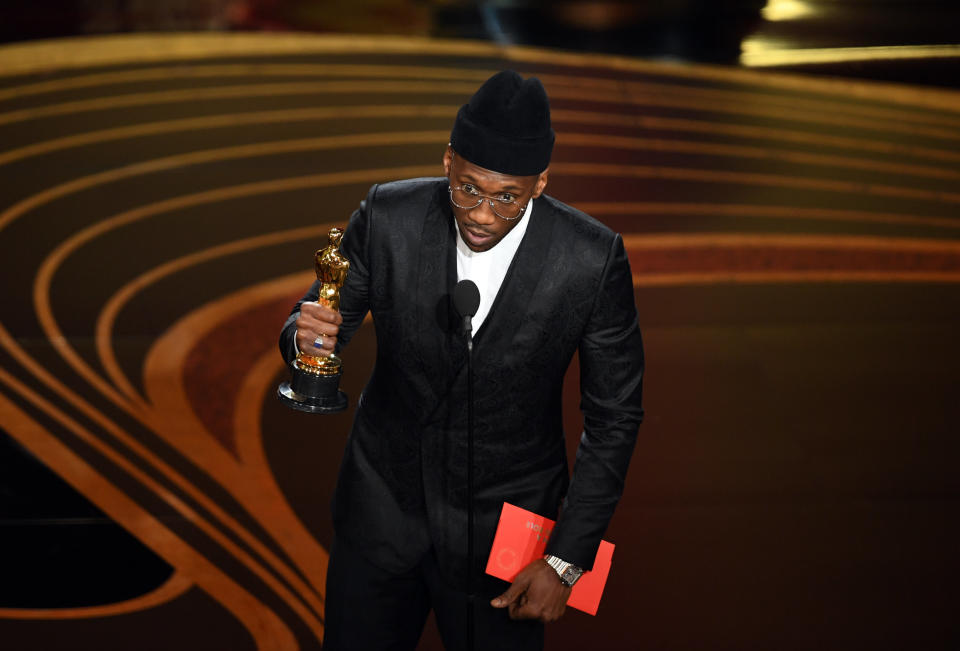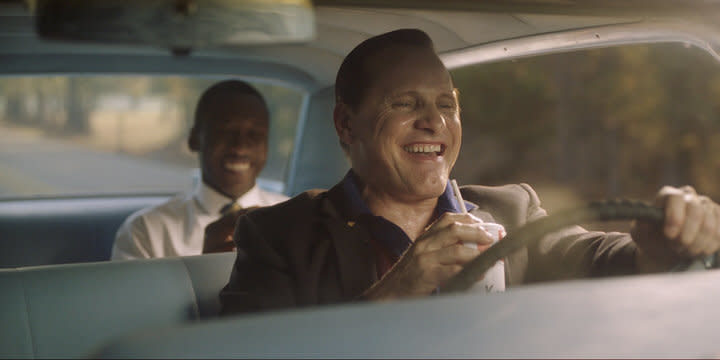Mahershala Ali Wins Best Supporting Actor Oscar For ‘Green Book’
Wherever Mahershala Ali stores all of his acting awards — which already includes an Oscar (for “Moonlight”), Golden Globe (“Green Book”) and BAFTA (“Green Book”) — just got a little more cramped.
The 45-year-old “True Detective” star won his second Oscar for Best Supporting Actor for his portrayal Dr. Don Shirley in “Green Book” at the 91st Academy Awards Sunday night.
“Trying to capture Dr. Shirley’s essence pushed me to my end,” Ali said while receiving his award.

He also dedicated his award to someone very special in his life.
“I want to dedicate this to my grandmother, who has been in my ear my entire life telling me that if at first I don’t succeed, try, try again,” Ali said.
“Green Book” follows the true-life story of the budding friendship between jazz pianist Don Shirley (Ali) and Tony “Lip” Vallelonga (Viggo Mortensen) after Shirley hires Vallelonga to act as a driver and bodyguard as he embarks on a musical tour of the Jim Crow South in the early 1960s.
The film was co-written by Tony Lip’s son Nick Vallelonga, who based the screenplay on his father’s recollections of the road trip. Though “Green Book” has been embraced by some audiences and is an awards season darling, controversy has swirled around the movie since its November premiere last year.
In November, two relatives of Shirley — the pianist’s 82-year-old brother Maurice Shirley and nephew Edwin Shirley III — told NPR’s 1A Movie Club that the film is brimming with inaccuracies. Maurice went as far as to describe it as “a symphony of lies” to Shadow and Act.
Upon hearing their comments on NPR, Ali reportedly called both Maurice and Edwin the same day the episode aired.
“What he said was, ’If I have offended you, I am so, so terribly sorry,” Edwin told Shadow and Act. “’I did the best I could with the material I had. I was not aware that there were close relatives with whom I could have consulted to add some nuance to the character.’”
A rep for Ali told HuffPost that the actor was not apologizing “for the film” itself at the time, but gave no further details about his apology.
Yet there was also plenty of criticism from those who say the feel-good movie meant to pull at the heartstrings oversimplifies decades of racial dynamics in the United States — especially in scenes in which Tony Lip introduces Shirley to Little Richard and fried chicken, or saves Shirley from multiple racist incidents.

“There’s not much here you haven’t seen before, and very little that can’t be described as crude, obvious and borderline offensive, even as it tries to be uplifting and affirmative,” The New York Times’ A.O. Scott wrote.
HuffPost’s Zeba Blay felt the movie was simply boring.
“I guess, in order to accept this movie as a crowd-pleaser, one must consider which crowds it’s pleasing,” she said in December. “I think the things that make this movie ‘feel good’ are, quite frankly, the things that make people feel good about not being aggressively racist. And that, to me, is the most boring thing of all.”
Love HuffPost? Become a founding member of HuffPost Plus today.
This article originally appeared on HuffPost.
